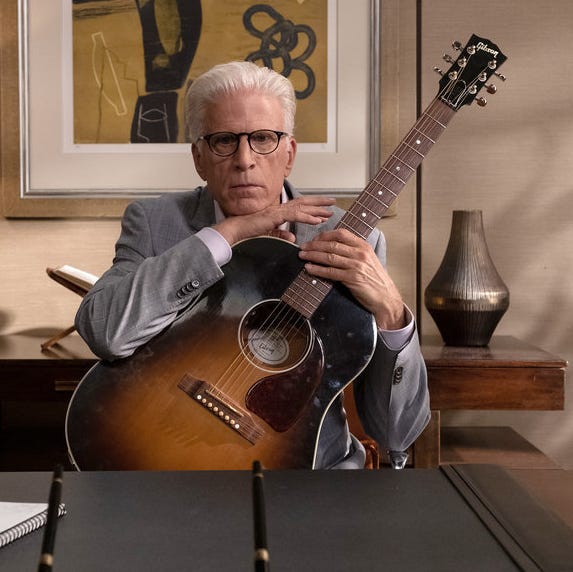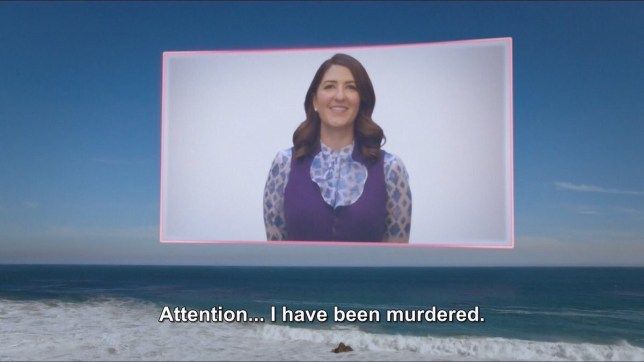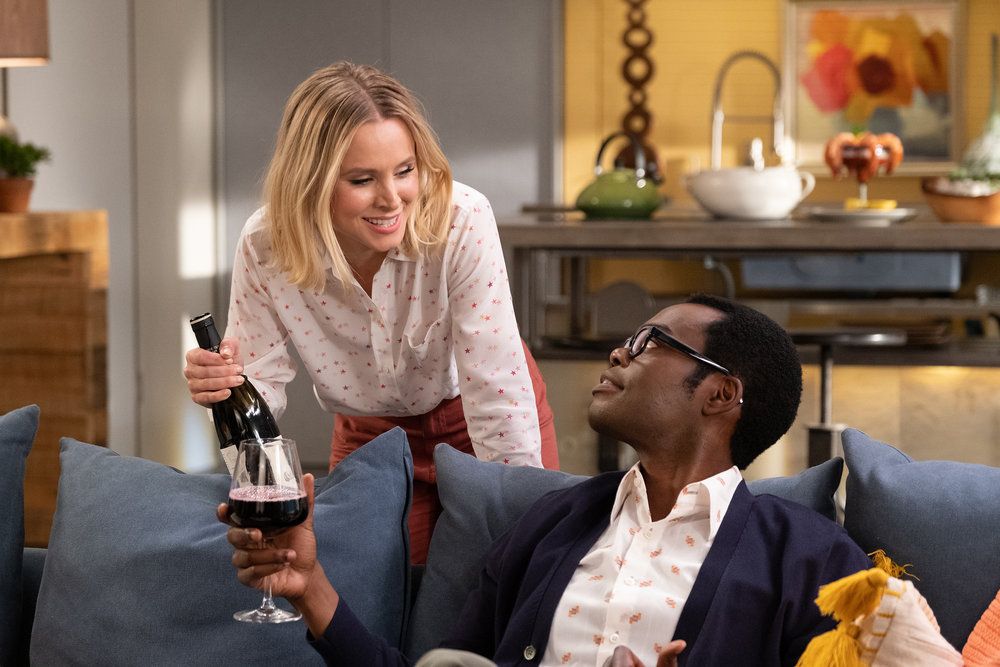
The Good Place Finale Reminds Us It's Okay to Go
by R. Eric ThomasHow to eulogize The Good Place, a series of such open-hearted beauty and moral purpose, here and then gone in a fraction of a Jeremy Bearimy? Perhaps it's best to go back to the beginning. Not the premiere, but before that. Way back, before Patty the Philosopher, before any humans at all, all the way back to dinosaurs. Prior to spending my evening alternately crying and chuckling at the close of the NBC sitcom's all-encompassing story, I spent my day thinking about dinosaurs who fell in love. Let's start there.
Musician Tom Rosenthal posted a video on Twitter of a song his three-year-old daughter Fenn wrote called "Dinosaurs in Love." The video went viral very quickly and for good reason. "Dinosaurs in love," sings Fenn in a sweet, tiny voice. "Dinosaurs say 'thank you.' A Big Bang came and they died. Dinosaurs, dinosaurs fell in love. But they didn't say goodbye." It wasn't even noon yet and I had already been thoroughly destroyed.

I couldn't help thinking of the dinosaurs (they were in love!) and their untimely end (they didn't say goodbye!) as I watched last night's two-part finale, "Whenever You're Ready." In the series' penultimate episode, "Patty," the six central characters finally reached the real Good Place, only to discover that it was too much of a good thing. Hypatia of Alexandria (a very welcome Lisa Kudrow) revealed that an eternity of getting everything they ever wanted turned former humans into glass-eyed shells. Relieved of the inevitability of death, and of consequence in general, they found their lives meaningless, and so the Good Place became a sort of Purgatory, albeit a Purgatory with milkshakes made of star dust. The solution? Let the people say goodbye.
Michael (Ted Danson), now in charge of the Good Place, devised a door in a forest of redwoods that would, whenever the individual was ready, allow them to cease to exist. They created death inside of death. And so the finale acted as a coda to the series, tracking the core cast through hundreds of Jeremy Bearimies until they were finally at peace with their existences and ready to slip into another room, to paraphrase the priest Henry Scott-Holland. Except this room was no room at all. Like Scott-Holland's description of death, it was nothing. It was the dot in the Bearimy. It was the end.
On one hand, it was a fairly traditional way to end a sitcom. The characters we'd grown to love got to luxuriate in each other's presence and then go off into the sunset from which (barring a reboot or a reunion special) they'd never return. And this is right. A finale should serve as an act of narrative and emotional closure, assuring us that the conflicts that kept the plot running had all been resolved and that everything was set right. It's Mary Tyler Moore casting one last look at the studio before turning off the light. It's the Friends leaving the keys to the apartment. Though Six Feet Under is very much not a sitcom, it's also Claire flashing forward to the deaths of everyone she knows and loves, concluding with herself. It's a television show's way of telling us it's okay to go.
On the other hand, however, The Good Place's finale was striking in its audacity. After four years of the meaty and meaningful work of creating comedy out of moral philosophy, creator Michael Schur and the brilliant team behind the show came back to the question, posed early in the first season, of what we owe to each other. Back then, Chidi (William Jackson Harper) used philosopher T.M. Scanlon's book What We Owe to Each Other to help Eleanor (Kristen Bell) develop a deeper moral understanding. Midway through the finale, she finally finished the book. She'd grown, yes, but she was also left with the knottier question of how we justify our actions toward others, and found that it extends to existence itself. Simply put (in terms of philosophical sophistication, I'm a Jason Mendoza), do we owe it to each other to stay?
The Good Place's answer is no. Somehow this doesn't come off as fatalistic, but rather deeply moral. When each character found existential peace, they bid their goodbyes and, though their friends were sorry to lose them, by and large the ones remaining didn't force them to stay. Paradise, according to Chidi, is having enough time with the people we love. What's remarkable about The Good Place is it conceives of a space where enough time is possible.

This works on a meta level for a series that decided that four seasons was enough, despite the clamor for more from fans. One wonders if it's possible for it to work on a human level. What is enough love? What is enough time? Jason (Manny Jacinto) describes the peaceful feeling of enough as if the air inside his lungs was the same as the air outside. I was reminded of a metaphor for love that playwright Lindsay Joelle uses in her audio play The Messengers, out in March from Audible. Joelle terms it "fish weather," referring to the way the body temperatures of fish match the temperature of the water that surrounds them. It's the pleasant feeling of everything and nothing. A boundless sameness. It's the opposite of the Purgatory that the Good Place became: A vision of heaven that is not about getting and clamoring and consuming, but rather being at peace with everything around you, even the people you fought so hard to hold on to. Especially the people you fought so hard to hold on to.
So, back to the dinosaurs. It isn't a tragedy in Fenn's song that the Big Bang comes. The Bang already happened; we should work on processing it if we haven't already. The heart, rather, is in the line, "they didn't say goodbye." The Good Place asked a lot of big questions that will never be answered, but it left us with one that, though immense, is perhaps within our grasp: If the Big Bang doesn't come, how do we live in such a way that we have enough to say goodbye?